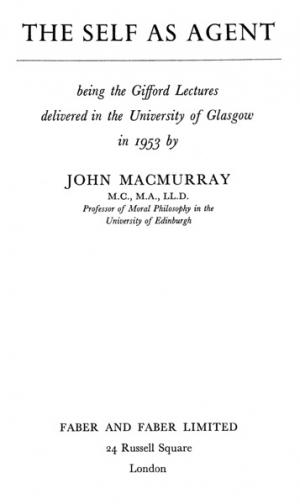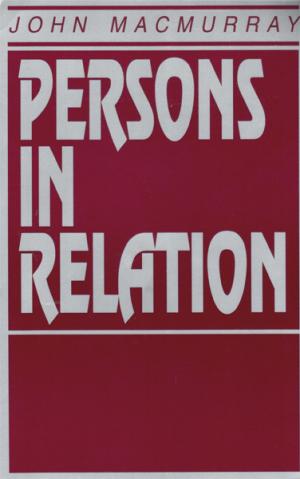John Macmurray asserts the primacy of the practical over the theoretical in The Self as Agent, demonstrating that philosophical analysis should begin with the Self as an agent of action in the world. In Persons in Relation, John Macmurray extends his work in The Self as Agent, showing the Self in proper existence within a community of relational beings and asserting that ‘there can be no man until there are at least two men in communication.’
The Form of the Personal
Books
The Self as Agent
Chapter One: The Crisis of the Personal
Chapter Two: Kant and the Romantics
Chapter Three: The Rejection of Dualism
Chapter Four: Agent and Subject
Chapter Five: The Perception of the Other
Chapter Six: Implications of Action
Chapter Seven: Causality and the Continuant
Chapter Eight: Reflective Activity

Macmurray’s primary criticism of the Western philosophical tradition is that it begins from a theoretical, rather from than a practical, standpoint. In The Self as Agent, he critiques and corrects Descartes’ ‘I think’ with the ‘I do’, a construction of the Self existing first and foremost as an agent of action in the world. In chapter 1, ‘The Crisis of the Personal’, he expresses his concern that philosophy’s emphasis on objectivity necessarily results in an atheistic approach.
Persons in Relation
Chapter One: The Field of the Personal
Chapter Three: The Discrimination of the Other
Chapter Four: The Rhythm of Withdrawal and Return
Chapter Five: Morality and its Modes
Chapter Six: Community and Society
Chapter Seven: The Celebration of Communion
Chapter Eight: Reflection and the Future

Persons in Relation presupposes the conclusions of The Self as Agent to complete Macmurray’s analysis of the form of the personal by establishing the Self as an agent constituted by his relationship to the Other, that is, by mutual relationships with other persons. Macmurray argues that an isolated agent is a self-contradiction because agency requires relationship with the Other as resistance and support to his actions in order to be able to do anything (i.e., in order to be an agent).


